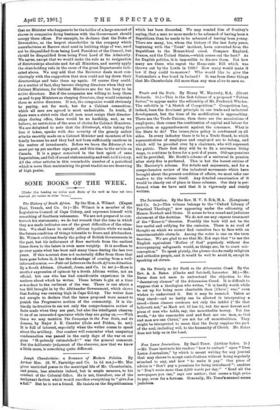On the Trinity as Set Forth in the Athanasian Creed.
By the Bev. A. A. Bates. (Clarke and Satchell, Leicester. 3d.)—Mr. Bates does not seem to understand the objection to the " damnatory clauses" of the Athanasian Creed. It is difficult to suppose that a theologian who writes, "it is hardly worth while to set up for being more charitable than [Christ] was," even wishes to understand it. But it may be restated. Taken as they stand—and no laxity can be allowed in interpreting a creed—these clauses condemn not only the infidel (.' He that believeth not," as Mark xvi. 16 has it), but the most devout and pious of men who holds, say, the monothelite heresy. Yet the words, "As the reasonable soul and flesh are one man, so God and man are one Christ," are not far off monothelitistn. They might be interpreted to mean that the Deity supplies the part of the soul, including will, to the humanitrof Christ. Mr. Bates does not help us in the least.






















































 Previous page
Previous page